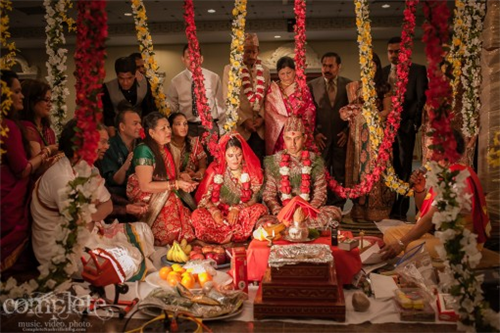By Robert King
Cameron University Nepalese Association (CUNA) hosted the Nepali Night event at 5 p.m., April 17, in Cameron’s McCasland Foundation Ballroom at McMahon Centennial Complex.
Nepali Night brought many Cameron students and faculty together to celebrate the Nepali New Year of 2073.
CUNA members performed traditional Nepalese dances and music while wearing attire common in Nepalese culture. Members also served popular Nepalese dishes like an appetizer of chicken drumsticks, stir-fry gram peas with peanut salad and prawn chips.
CUNA President and senior computer science major Pramod Poudel says the Nepali calendar is ahead of the Gregorian calendar because of history and religion.
“It goes way back, in our country it is B.S. and your country is A.D,” he said. “All around the world, except our country, is at 2016. The AD time scale comes from Jesus.”
 |
| CUNA President Pramod Poudel (left) and Treasurer Shashank Adhikari (right). Nepali Night celebrated Nepalese culture and thecoming of year 2073. |
In the Gregorian calendar BC and AD are based on Christ, where BC means ‘before Christ’ and AD is after birth. The Nepali calendar is not determined by events in Christian beliefs.
The Nepali Patro is approximately 56 years and 8 and months ahead of the English Gregorian Calendar. In Nepal, the New Year starts approximately April 17. The length of a Nepali month varies each year. One month could last up to 32 days.
Poudel hopes that 2073 is the year to overcome the tragedy of a recent earthquake in Nepal.
“In 2072 we had a massive earthquake,” he said. “Too many people died. We are trying to overcome that in 2073. Our country will fight back, we will go recover this coming year, we hope.”
CUNA welcomes anyone to attend the events and even join the organization if interested. Membership is not limited to Nepalese students.
Treasurer and sophomore IT major Shashank Adhikari says that CUNA helps add to the diversity at Cameron.
“At Cameron we have lots of international students,” he said. “We are one of the international clubs at Cameron and we collaborate with other clubs and do programs that will give other people a hint of our cultures.”
CUNA recently became a five-star organization at Cameron. The group puts on two Nepali Nights a year to encourage students to participate in the celebrations of Nepalese culture.
Adhikari says that one goal of CUNA is to help students from Nigeria adjust to life in the United States.
“Whenever international students come here for the first time we help them get apartments,” he said. “We help them figure out what to do. When we came here, we just started here and we didn’t know what to do. We want to help them, show them how college works in the United States, because the education systems are different between these two countries.”
On the CUNA Facebook page, admin Raju Bhusal thanks those who attended and helped make Nepali Night successful.
“It is the teamwork and their collective efforts that made all the difference,” he wrote. “We will walk together in the days to come.”
There will be a final meeting on April 23 for 2015-16 school year where they will elect new officers for the 2016-17 academic year. For more information see the CUNA Facebook page.
